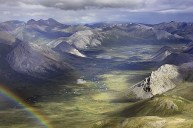Rising water levels aren't the only thing you should worry about when it comes to melting ice in the Arctic. Scientists are also warning about diseases and viruses hidden among all that ice.
Scientists predict that diseases called "Methuselah microbes" could have remained dormant in the frozen ice and frozen remains of animals for thousands of years. As the permafrost melts, these ancient diseases could be unleashed upon all of us. Given the fact that humans wouldn't have built up immunity, these arctic diseases could cause a pandemic.
Arctic Dangers
Co-author of the study, Dr Khaled Abass, of the University of Sharjah, said, "Climate change is not only melting ice—it's melting the barriers between ecosystems, animals, and people. Permafrost thawing could even release ancient bacteria or viruses that have been frozen for thousands of years."
There's been warning signs about the Arctic. In 2014, scientists isolated viruses from the permafrost and found they were still infectious. Fast forward to 2023, and scientists defrosted a virus frozen 48,000 years ago. The permafrost and glaciers could be a frozen Petri dish of bad germs waiting to be reintroduced into the world again.
Researchers believe that the number of pathogens in the Arctic is the real issue. If one of these nasty viruses take root in society, then it could be devastating. It could be hard to stop a global pandemic.
Abbas said, "Climate change and pollution are affecting both animal and human health—our research looked into how these two forces are interconnected. As the Arctic warms faster than most other parts of the world, we're seeing changes in the environment—like melting permafrost and shifting ecosystems—that could help spread infectious diseases between animals and people."
Researchers also highlighted the lack of medical infrastructure in the region. Viruses could then hop a ride down South and infect society. The study is an alarming one of the dangers of global warming.
Abbbas explained, "The environmental stressors we studied have ripple effects that reach far beyond the polar regions."




